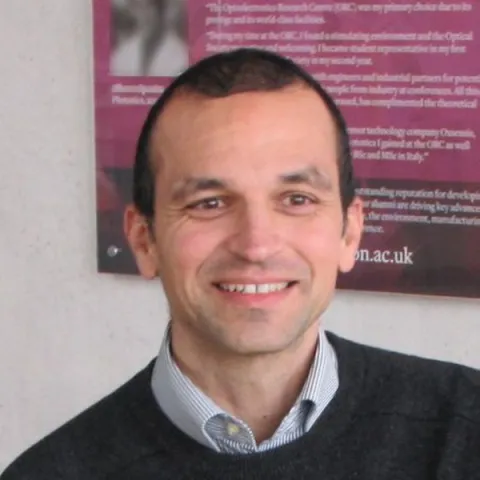Project overview
Internet communications have effected a massive transformational effect in modern societies over the past few decades, affecting all aspects of modern life, from commerce and healthcare through politics to education and entertainment. Optical communication technologies have played a decisive role and remain central to this revolution. Wavelength division multiplexing allows the transmission of hundreds of terabits per second over a single mode fibre and has enabled wavelength routing, where the optical frequency, rather than the physical fibre path, determines the routing of a signal in a network. The relentless growth in communication traffic necessitates an effective use of network resources, and in response, modern optical networks increase in complexity and require dynamic allocation of their resources.
The ultimate objective of this project is to enable a next generation reconfigurable add-drop de/muliptlexer that will allow re-allocation of the signal wavelength through all-optical wavelength conversion. In order to achieve this, juNIPeRS will study silicon-rich silicon nitride as a CMOS-compatible optical nonlinear material platform and will exploit its unique characteristics to implement integrated devices with unprecedented nonlinear performance.
juNIPeRS will follow a vertical research path, that will include material optimisation and fabrication of photonic integrated systems, device design and optimisation, system integration, and demonstration and testing in a communications environment. Specifically, juNIPeRS will:
- Develop low-loss, dispersion engineered nonlinear waveguides that will form the core of wavelength converting systems.
- Optimise couplers for efficient coupling of light between these integrated components and fibre optic systems.
- Demonstrate integrated wavelength converters and phase-sensitive amplifiers, the operation of which will be independent of the polarisation of the incoming signal.
- Implement multi-layered photonic systems integrating both linear (e.g. switches) and nonlinear components (e.g. wavelength converters).
With the development of the new technological platform, the ambition of juNIPeRS is to facilitate a shift in the design of flexible optical networks, where practical integrated photonic components will be used for the manipulation of the optical frequencies. The new material platform is expected to have important implications in other areas of nonlinear optics outside communications, and the investigators will take active steps to promote it.
juNIPeRS brings together academic groups and key industrial partners who are best placed to critically appraise the commercial relevance of the new technology and guide its development. The project will train a new generation of highly qualified optical engineers and will contribute to the health and sustainability of the UK photonics sector.
The ultimate objective of this project is to enable a next generation reconfigurable add-drop de/muliptlexer that will allow re-allocation of the signal wavelength through all-optical wavelength conversion. In order to achieve this, juNIPeRS will study silicon-rich silicon nitride as a CMOS-compatible optical nonlinear material platform and will exploit its unique characteristics to implement integrated devices with unprecedented nonlinear performance.
juNIPeRS will follow a vertical research path, that will include material optimisation and fabrication of photonic integrated systems, device design and optimisation, system integration, and demonstration and testing in a communications environment. Specifically, juNIPeRS will:
- Develop low-loss, dispersion engineered nonlinear waveguides that will form the core of wavelength converting systems.
- Optimise couplers for efficient coupling of light between these integrated components and fibre optic systems.
- Demonstrate integrated wavelength converters and phase-sensitive amplifiers, the operation of which will be independent of the polarisation of the incoming signal.
- Implement multi-layered photonic systems integrating both linear (e.g. switches) and nonlinear components (e.g. wavelength converters).
With the development of the new technological platform, the ambition of juNIPeRS is to facilitate a shift in the design of flexible optical networks, where practical integrated photonic components will be used for the manipulation of the optical frequencies. The new material platform is expected to have important implications in other areas of nonlinear optics outside communications, and the investigators will take active steps to promote it.
juNIPeRS brings together academic groups and key industrial partners who are best placed to critically appraise the commercial relevance of the new technology and guide its development. The project will train a new generation of highly qualified optical engineers and will contribute to the health and sustainability of the UK photonics sector.
Staff
Lead researchers
Other researchers
Collaborating research institutes, centres and groups
Research outputs
Jonathan R. C. Woods, Jake Daykin, Amy S. K. Tong, Cosimo Lacava, Periklis Petropoulos, Anne C. Tropper, Peter Horak, James S. Wilkinson & Vasilis Apostolopoulos,
2020
DOI: 10.1117/12.2546574
Type: conference
Joaquin Faneca Ruedas, Thalia Domínguez Bucio, Frederic Gardes & Anna Baldycheva,
2020, Applied Physics Letters, 116(9), 93502
DOI: 10.1063/1.5140350
Type: article
Y. Hong, Ke Li, C. Lacava, Shenghao Liu, D.J. Thomson, Fanfan Meng, Xiaoke Ruan, Fan Zhang, G.T. Reed & P. Petropoulos,
2020
Type: conference
Joaquin Faneca Ruedas, Thalia Domínguez Bucio, Frederic Gardes & Anna Baldycheva,
2020
DOI: 10.1117/12.2543559
Type: conference

